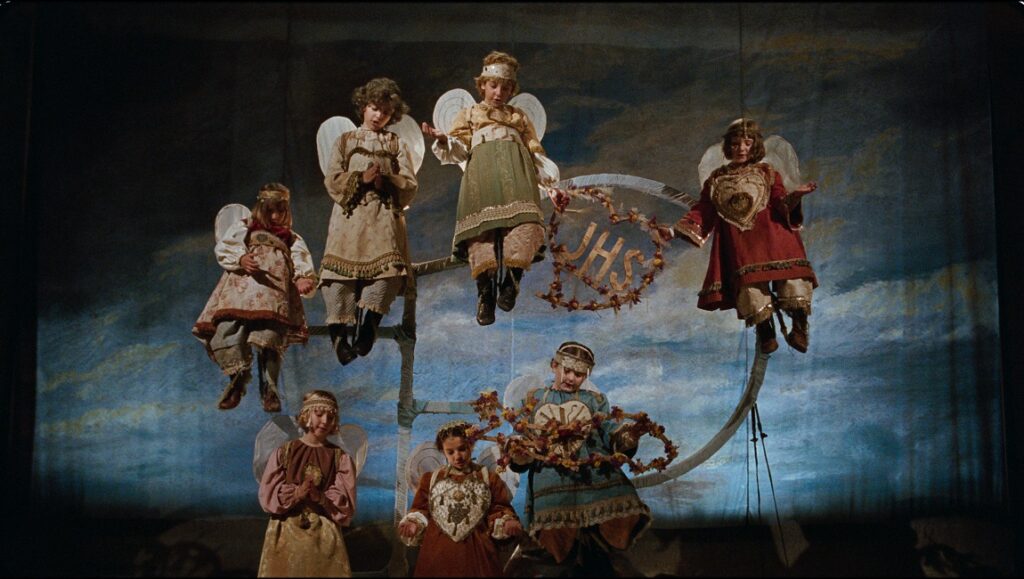Holiday event filmmaking comes with a simple crutch — these stories nearly always end in a lesson. Art created for and surrounding children typically leans into the moralistic so as to not lead its young audience astray of larger scale authority, and yet is often blind to context. Alice Rohrwacher’s mid-length Christmas tale Le Pupille instead takes her young subjects — and young audience — seriously, respecting their decisions to both defy and meet authority with a malicious obedience, and meeting them with the same artistic background she would employ with older subjects. Refreshingly, the result is that this fable is one without a lesson. The setup is simple: a group of orphan girls grow frustrated with how much is expected of them at a time when they want nothing more than to play. The girls find that they have two paths — they can delight in their imaginations, and live out their childhoods (and their cravings: the shimmery pink cake that has arrived for Christmas delights the group); or they can follow the rules so perfectly that it becomes clear to the nuns (including Alba Rohrwacher as the Mother Superior) that the rules make just as little sense to them as the girls. The delightful performances are aided by Rohrwacher’s casting of amateurs, specifying that she wanted girls who were not informed by a desire for an acting career, as well as the constraint of only using period appropriate visual effects.
This tale of childhood immorality originates not in youth folklore, but instead takes inspiration from a letter from novelist Elsa Morante to literary critic Goffredo Fofi, and spins a wide-eyed fantasy about the film’s central cake. Its story is supplemented by playful editing choices, like the rounded corners, sped-up shots that mimic an undercranked silent-era film, and literalism to a T(itle) via quick cuts to the centers of the girls’ eyes, which help to balance the otherwise dour Dickensian setting. Elsewhere, cinematographer Hélène Louvart will sometimes allow her camera to rest on a freeze frame of a nun, in a steady encapsulation of how quickly memories of power can be ingrained in children’s minds. Childlike wonder, seen as the girls contemplate their heist, is further heightened by the rare saturated setpieces, concentrated on traditional sins made holy by their ties to Christmastime. The cake itself (and presiding gluttony), as well as the theatrical performance the girls participate in for the occasion, are rendered merry and bright with warm, saturated color, a Visconti in an early Rossellini world. Meanwhile, Louvart’s Super 16 work here is visually reminiscent of frequent Powell & Pressburger collaborator Jack Cardiff, seamlessly blending the fluid, child’s-eye activity with the Technicolor-esque freeze frame visual charm of Old Hollywood Christmas classics. Perhaps this might even serve as an entry point for family viewings of nostalgia art-Christmas classics such as Meet me in St. Louis.
Rohrwacher’s amoral fable, though a delightfully rare higher-profile mid-length film dropped into an era of silver screen epic versus glorified TikTok binarism, could arguably benefit from a lengthier study of the institution its narrative is held within. Though the somewhat underbaked narrative is limited to that of the letter, the cultural rise of a Mussolini-era fascist Italy lurking in the background, paralleled with the authoritarian religious state of the Catholic school, reflects a maturation of Rohrwacher’s typical themes. But this is largely besides the point, as Le Pupille‘s short length is enticing given its Disney+ platform and its potential to be an early family introduction to cinema outside the U.S. (though, the streaming service’s default to an English dub is disappointing). It’s rare for a children’s film outside the United States to make its way toward the broader family market outside of more education-facing providers or services like Kanopy, so despite the regrettable anglicized dubbing, and given its holiday tie-in appeal, Le Pupille is still a step in the right direction for broadening the cinematic horizons of young viewers.
You can currently stream Alice Rohrwacher’s Le Pupille on Disney+.


Comments are closed.